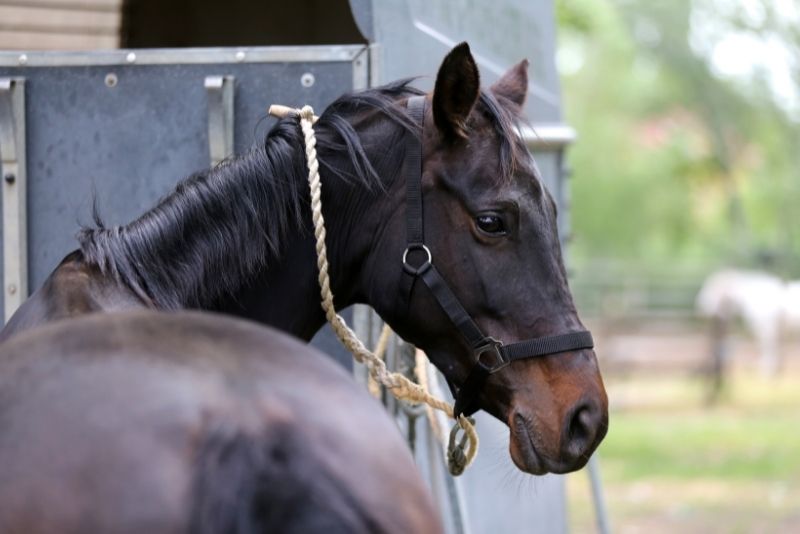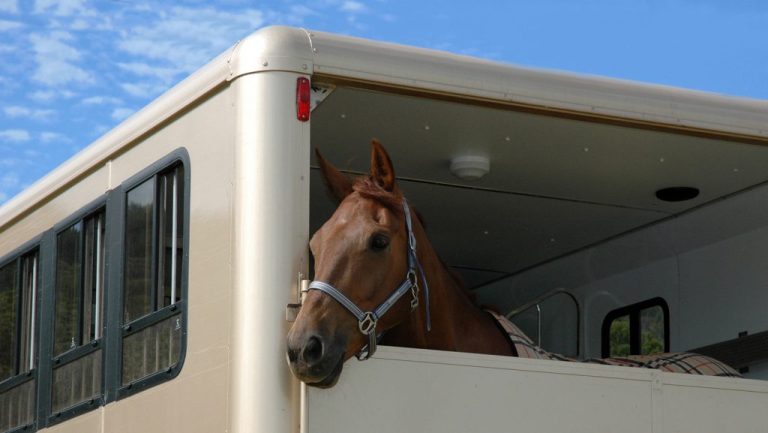Categorised as ‘specialist motor insurances’, there are numerous types of cover you may not have even heard of, ranging from modified vehicles to imported cars. But you wouldn’t have found this article had you not been searching for horsebox insurance.
Insurance and financial chores can be a hassle but just because they can get specific, and specialist insurance tricky to find, does not mean that they are any more difficult. A-Plan values your horse as much as you do. Here is everything you need to know about the comprehensive horsebox insurance you need.
Read on so you can canter your way to a more informed position so you don’t break early. You and your four-legged friend can travel with peace of mind after reading everything you need to know about horsebox insurance:
What exactly is horsebox insurance?
The first step in acquiring the horsebox insurance you need is knowing what you’re looking for. Unfortunately, whether you are new to specialist motor insurance or not, it can also be one of the most daunting.
Simply put, horsebox insurance protects your horsebox against different kinds of accidents that can result in the damaging of your vehicle, or the damage done by your vehicle to others’ property. There are different types of insurance you can get, all of which are explained below.
But it is in understanding what you need which is the question you want answering. Keep scrolling for more in-depth detail about your possible options.
Note that horsebox insurance does not cover your horse, so you may want to look into A-Plan’s equine insurance as well.
Do I need horsebox insurance?
Yes – it is a legal requirement. Your horsebox must be insured. A quick Google search will provide you with the same answer, if you haven’t already tried. Horseboxes require the same basic treatment as regular cars.
Keep in mind that even Horse and Hound has said that the cheapest insurance is not always the best value because your personal needs and wants are not necessarily met, which is exactly what you do not want to do. Worst case scenario is not being covered for something and any claim you make becomes invalid.
This is why choosing the right insurance for you and your situation is essential to getting the best deal possible. A-Plan encourages their customers to speak to their team of dedicated and knowledgeable specialists to help you every step of the way.
Not only will this save you time and money, but will also ensure you know exactly what policies you need and are covered by.
Some insurance companies tailor their policies to the customer which means you get a custom-made deal with the right insurance cover that was made just for you.
How does horsebox insurance protect you?
Just as regular car insurance covers you against somebody accidentally hitting the back of you, horsebox insurance is equipped with similar types of protection.
However, some insurances make it so you are only covered against causing damage to others’ property, not your own – therefore you must ensure you have the horsebox insurance you need.
Here are the insurance types you can choose between:
Fully comprehensive: As the name suggests, this is the best insurance if price wasn’t an issue because it covers you against most accidents. You will be protected against: third party claims; repair and replacement costs; and damage caused by fire or theft.
Some comprehensive horsebox insurances even cover damage done to the horsebox by your horse.
Third party, fire and theft: Covers against only third party claims (where you are at fault) and damage or loss caused by fire or theft.
Third party only: Third party claims are covered but anything else, such as fire damage or theft, is not. This is the minimum legal requirement for all vehicles in the UK.
Due to the fact there there are various types of policies you can be insured by, you must double check that you get what you need. These are the exact types of queries and problems A-Plan’s skilled telephone team are more than happy to help with.
Is fully comprehensive insurance worth it?
This is something that is for you to decide because only you know what you need with your insurance. Of course, any of your questions can be answered over a quick telephone call with a specialist who can advise you appropriately, but it is your choice what you want to be covered by.
Essentially, fully comprehensive insurance is definitely worth it if you feel as though you need it. This can depend on a number of variables, including how susceptible you feel you are to theft or fire damage.
It may also be wise looking into fully comprehensive insurance if you are driving on dangerous or difficult roads for a long period of time, such as busy motorways or narrow country lanes. You may take slow turns round corners with little to no visibility for the safety of you and your horse, but the car coming towards you may not.
A-Plan horsebox insurance offers 24/7 breakdown cover 365 days of the year. This means that no matter where you are in the UK, you can be rescued by your fully comprehensive insurance.

Now imagine breaking down in the middle of nowhere with your horse in the knowledge that no-one can come and rescue either of you.
This becomes further problematic if you do not have friends with horseboxes or trailers who can help you, as you then cannot rely on anybody.
Reparations and replacements can also be extremely costly. If you are unable to afford this risk then as a general rule of thumb it is better to be safe than sorry.
You will be essentially paying for peace of mind and preventing stressful use of your horsebox, happy and at ease with the thought that you are fully covered with your comprehensive insurance.
What is a third party claim?
In a nutshell, a third party claim is a claim made by someone (the third party) after an accident that wasn’t their fault, for example if you accidentally drove into them.
That same third party can claim compensation (coming out of your insurance) to pay for damage done to their vehicle and/ or any injury.
Horsebox insurance exclusions
Some insurances restrict their cover to have certain requirements that must be met. This means that if these requirements aren’t met then you may be excluded from certain horsebox insurers.
Age: Some insurers will only cover drivers over the age of 21. However, A-Plan’s premium benefits allow for anyone to be covered by horsebox insurance, ranging from ages 17-79.
Weight: If your horsebox exceeds certain weights then you may be excluded by certain policies. You also need a specific driving license for vehicles that weigh over 3.5 tonnes (more on this below).
Contents: Anything inside your horsebox is unlikely to be covered, including your horse.
As always, you will want to double check you are covered by everything you need.
Who can drive an insured horsebox?
Your horsebox can only be driven by those who are named in your insurance’s legal documents. This means that if you intend on letting someone else drive your horsebox then your insurance must be made aware of this, which may cause your insurance to go up for this increase of cover.
Getting into an accident where the driver of your horsebox is uninsured can lead to serious complications. You will be unable to make an insurance claim and could be fined or even prosecuted.
Whose horses can travel in my horsebox?
You can transport others’ horses in your horsebox, such as a friend’s, but only if no money (excluding fuel costs) is paid to you. This is because you must be insured and covered as a business if you are charging money to transport horses. Generally, this type of insurance is called hire and reward, and is separate to insurance for private use.
If this is something you are planning to do then make sure you do not breach any policies and get the insurance that’s right for you.
Driver licensing
Another important factor to consider is to ensure you have the correct driver’s license to be legally allowed to operate a horsebox.
A normal driver’s license for regular cars (Category B) is invalid for driving vehicles that are over 3.5 tonnes in weight. Vehicles that weigh between 3.5 to 7.5 tonnes require the driver to possess a category C1 license.
If you are planning on driving your horsebox yourself then you will need to look into acquiring a C1 license if you haven’t already.
How to minimise accidents and costs
The best way to minimise costs and to avoid accidents with your horsebox is to keep it well maintained and always ensure it is safe for the roads. This can be done in a number of ways.
Check your tyres: Ensure that all your tyres are up to standard by checking their pressure, especially before long journeys. It is wise to carry a spare.
Check your lights: Before setting off, check if all of your lights are working, especially your indicators. Double check your headlights as well if you are planning to travel in the dark (best to do it regardless).
Annual service: Remember to service your horsebox at least once a year. This is incredibly important as things like brakes can wear and tear over time.
A clean vehicle is a safe vehicle: Try to keep your horsebox as clean as possible, especially on the outside and the underside. Try to do this after each use. Your horse could potentially cause damage to the inside as well, so be sure to keep your horsebox generally clean all around.
Taking your horsebox abroad
If you are planning on taking your horsebox abroad then check your insurance to ensure you have the same cover as you do in the United Kingdom.
You may need to contact your insurance broker for a “green card” in order to be permitted to travel abroad in your horsebox. This green card acts as proof of your motor insurance to other countries.
If you do not do this the proper way then you could be facing a hefty fine and/ or your vehicle getting impounded. You can also get prosecuted for driving without insurance.
It’s always a good idea to check your legal liabilities before setting off.
Further guidance
The Driver and Vehicle Standards Agency (DVSA) has a horsebox and trailer owner guide on the UK government website. This can be used to provide you with more information on how to keep your horsebox safe and ready for the roads.
Keep in mind that this is a guide and not a legal document.
How much does horsebox insurance cost?
A-Plan likes to make everything just a bit easier for you because we understand the stressful nature of picking the right insurance.
Our specialists are on the other end of the phone, or available in-branch if you prefer a face-to-face discussion. You find find your local branch details here. The team will be happy to answer any further queries you may have. A-Plan want what’s best for you so they will recommend the best possible insurance that is tailored to you, so you only pay for what you need.

